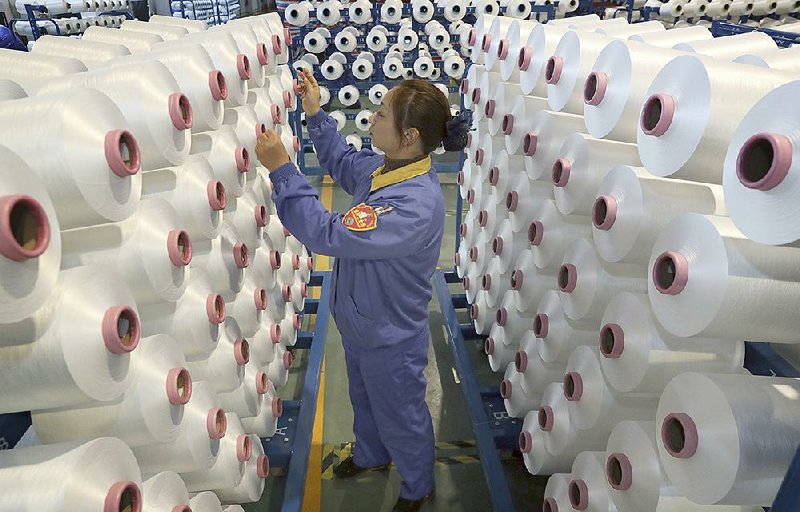WASHINGTON -- Low interest rates and reduced trade tensions likely will buoy the global economy over the next two years and help nurture steady if modest growth.
That's the view of the International Monetary Fund, which foresees world economic growth accelerating from 2.9% last year to 3.3% in 2020 and 3.4% in 2021. The 2019 estimate was reduced for a sixth time. The international economy is receiving a significant boost -- 0.5 percentage point of growth last year and this year -- from central banks' low-rate policies, the lending organization says in a global outlook report. The U.S. Federal Reserve, for instance, cut rates three times last year and expects to keep rates low for the foreseeable future.
BlackRock Vice Chairman Philipp Hildebrand described that effort as an "extraordinary pivot back to easier monetary policy" that will help growth edge up this year.
And an interim trade deal signed last week by the United States and China -- the world's two biggest economies -- is expected to add 0.2 percentage point to global growth this year by lowering tariffs and improving business confidence. The global economy is rebounding from some temporary stumbles, including a lull in new technology products and new emissions standards that disrupted car production.
Still, the IMF warns that the global economy continues to face an array of risks, including the possibility that trade tensions will escalate again. And many countries aren't benefiting from the modest upswing in growth.
Presenting the report Monday at a news conference in Davos, Switzerland, fund chief Kristalina Georgieva said that after a slowdown in 2019 there should be "a moderate pickup in global growth this year and next."
"We already see some tentative signs of stabilization," she said. "But we have not reached a turning point yet."
Gita Gopinath, the fund's chief economist, said one key is for the U.S. and China to push on and reach a more durable agreement.
"If these tensions return, that will undo all of the improvements in policy uncertainty that we've seen recently," she told Bloomberg Television. "It's a bit of a wait and watch."
Even in the United States, the fund foresees growth slowing from 2.3% in 2019 to 2% this year and 1.7% in 2021, partly because the boost that the economy received from President Donald Trump's 2017 tax cuts has been fading.
China's economy also will continue to decelerate, the fund predicts -- from 6.1% last year to 6% in 2020 and 5.8% next year. Though China's economy likely will benefit from the truce with the United States, Beijing continues to manage a difficult transition away from speedy economic growth based on often-wasteful and debt-fueled investments to slower but steadier growth built on spending by the country's growing middle class.
Likewise, Japan's economic growth, hobbled by an aging workforce, is expected to decelerate from 1% last year to 0.7% this year to 0.5% next year.
Collective growth in the 19 countries that use the euro currency is expected to gradually pick up: 1.2% in 2019, 1.3% in 2020 and 1.4% in 2021.
The IMF's global forecast is slightly bleaker than the previous one it issued in October, mainly because of an expected sharp slowdown in India: The world's seventh-biggest economy is expected to grow 5.8% this year, down from the 7% the fund had expected in October, and 6.5% in 2021, down from a previously forecast 7.4%. In addition, problems in the financial sector have reduced credit, crimping consumer spending in India.
While risks have eased, the IMF was clear that there's still plenty to worry about. Progress in trade talks is stop-start, simmering U.S.-Iran tensions could hit the oil supply, and there's also social unrest and weather-related disasters.
"The risk of protracted subpar global growth remains tangible despite tentative signs of stabilizing momentum," it said.
Separately, PricewaterhouseCoopers released a survey that showed the proportion of chief executive officers expecting global growth to slow in the coming year had risen tenfold since 2018.
That means that over half of the 1,581 CEOs questioned in 83 countries see the pace of expansion slowing, the most since PricewaterhouseCoopers began asking the question in 2012. The survey was conducted last September to October.
Information for this article was contributed by Paul Wiseman of The Associated Press and by Ana Monteiro, Zoe Schneeweiss, Catherine Bosley, Francine Lacqua and Haslinda Amin of Bloomberg News.
Business on 01/22/2020
